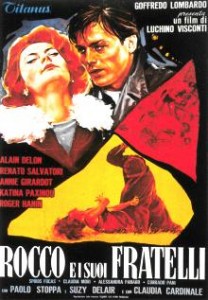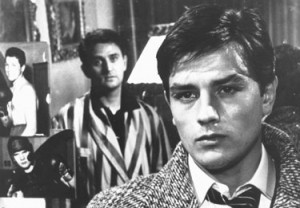The next Screen Talks event will be on Monday 25th March, 6.30 pm. Dr Danielle Hipkins will introduce Rocco and His Brothers (Luchino Visconti, 1960). Join the event on Facebook and find out more here.
Booking Information book online, call the Box Office: 0871 902 5730 or buy tickets on the door (half price for students on Mondays).
Dr Danielle Hipkins has written a guest blog post for us, outlining the importance of Rocco and His Brothers as a key film exploring issues of migration and identity at a key moment in Italy’s post-war transformation:
Although contemporary Italy may be plagued by economic and political crisis, in the late 1950s the country saw the beginning of a period of development so dramatic that it was labelled an ‘economic miracle’. This era transformed Italy from a predominantly agricultural country into an industrialized one. One of the main motors of this transformation was the steady supply of low-wage labour from the impoverished, agricultural south; between 1958 and1963 more than 900,000 southerners moved to northern Italy. Those moving from this underdeveloped area, still bound by feudal and religious tradition, into a consumer-oriented, individualist, and rapidly modernizing urban environment felt as though they had moved to a foreign country, and were often treated dismissively.
Rocco and His Brothers is the epic story of one such family of migrants, five brothers and their mother, who seek their fortune in Milan after the death of their father. There is perhaps no Italian film that narrates more powerfully the personal costs of migration: the hardships of surviving in a hostile environment and adapting to an unfamiliar set of cultural codes. This family melodrama draws out engaging performances from Alain Delon, Annie Girardot, and Renato Salvatori, locked in a love triangle that comes to dominate the film, as two of the brothers fall for the same woman. The film’s strength lies in the powerful emotional response that change elicits in the stories of Rocco and Simone, who find it most difficult to adapt, to accept changing social codes, and to let go of family loyalties and nostalgia for a lost world.
In my research in the Visconti archive in Rome I discovered how Visconti’s directorial approach to an ‘anthropomorphic’ cinema – a cinema that puts the individual drama at its heart led to sympathetic role for a woman that he did not originally anticipate. Thanks also to input from a female scriptwriter, Suso Cecchi d’Amico, and the lead actress herself, the character of the prostitute Nadia, who seduces one brother, but falls for another, developed beyond her original sketchy symbolization as figure of urban evil. Central to the film’s final shape, she complicates the Marxist ambitions that structure the film and reminds us that changing roles for men and women lie at the heart of the brothers’ problems.
1960 was a boom year for Italian cinema, producing La dolce vita (Federico Fellini) and L’avventura (Michelangelo Antonioni). However, whilst those two films explore the lives of Italy’s rich elite and their ennui, Visconti blended his fascination with opera and Communism into a powerful, melodramatic exploration of what it means to be at the sharp end of the economic scale, to be caught between two radically different cultures. Visconti’s daring use of real locations to screen sex, violence, and unpalatable truths about the foundations of Italy’s boom invoked the wrath of the censors, but contributed to creating an emotional narrative for a forgotten class. Visconti tells an unforgettable tale of what and who gets lost in the need to adapt and to survive in the modern urban environment.
Dr Danielle Hipkins is a Senior Lecturer in Italian in the Dept of Modern Languages, College of Humanities, University of Exeter. Read more about Danielle’s work here.


